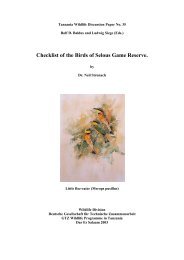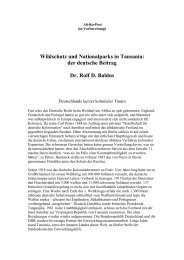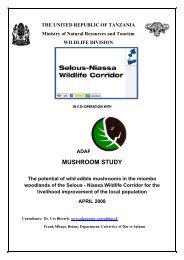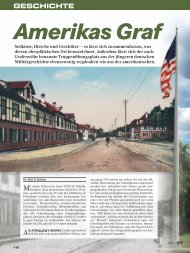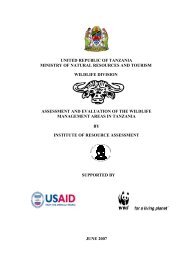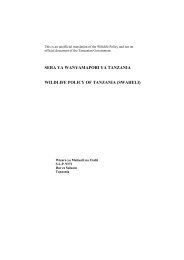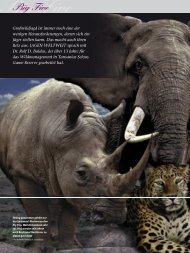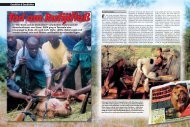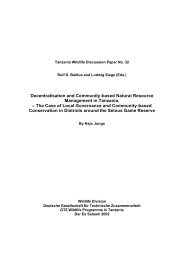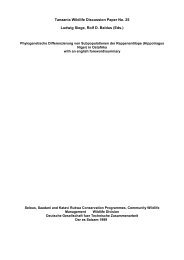African Indaba Articles - wildlife-baldus.com
African Indaba Articles - wildlife-baldus.com
African Indaba Articles - wildlife-baldus.com
You also want an ePaper? Increase the reach of your titles
YUMPU automatically turns print PDFs into web optimized ePapers that Google loves.
discussions, and questions focused on the role of markets, property rights, and law for the benefit of effective<strong>wildlife</strong> policy formation.One of the first speakers was Richard Leakey, former Director of Kenya’s <strong>wildlife</strong> regulatory agency,Kenya Wildlife Service. The content of Leakey’s presentation was a surprise to the audience, given his pastposition statements. Leakey <strong>com</strong>mented on the unsustainably and large scale of the illegal bushmeat trade.He stressed that hunting (in some form) has never stopped in Kenya despite the ban and is, in fact,widespread and out of control. Leakey went on to say that decision makers should consider a policy toregulate hunting, make hunting sustainable, and to allow people to derive value from <strong>wildlife</strong>.The ban on trophy hunting of almost three decades means that most Kenyans have never experiencedregulated tourist trophy hunting. Younger Kenyans know only of stories from the previous poorly-regulatedand corrupt hunting industry that lacked necessary controls and lacked <strong>com</strong>munity involvement.The goal of my presentation was to provide information on the economic and conservation status of thehunting industry in other countries in Africa so that Kenyans could see what works in other places. I alsospoke about how the hunting industry can improve its role in conservation (work done in collaboration with DrPeter Lindsey, see <strong>African</strong> <strong>Indaba</strong>, vol. 4, no. 4, article 12).After my talk, some of the young attendees <strong>com</strong>mented to me ideas they were not previously aware of,such as: the large-scale economics of trophy hunting, the high prices paid for some <strong>wildlife</strong> species on thelive sale market, and the successes of trophy hunting on <strong>com</strong>munal land in some parts of Africa.Discussions during the conference made clear that some of the time-tested principles of sustainable use,which are broadly accepted in other East and southern <strong>African</strong> countries (e.g., landholders having <strong>wildlife</strong>user rights), are questioned in Kenya.Some Kenyans feel that conditions and conservation issues in their country are different from thoseelsewhere in Africa, and that different solutions are needed, but not likely to be found. Others are concernedthat Kenya is too corrupt for controlled trophy hunting to work. A further concern about trophy hunting is thatit would provide another opportunity for a foreign industry to exploit local resources without reinvestingsignificantly in Kenya.Photographic tourism in Kenya suffers badly from leakage of revenues overseas and a failure to devolveadequate benefits to <strong>com</strong>munities. Some Kenyans fear that trophy hunting will operate on the sameinequitable basis.Some of the opposition to hunting in Kenya stems from media and policy influence from westernprotectionist and animal welfare organizations. Correspondingly, some of the delegates disregarded trophyhunting as an option without giving accurate, relevant, or factual justification for why it would not work inKenya. The fact remains that most <strong>wildlife</strong> species are reported to have declined by 40 - 90% since huntingwas banned.A workshop was held on the final morning, designed to allow conference speakers to discuss theconference proceedings and agree on conclusions. These have been submitted to the National SteeringCommittee for their consideration during the ongoing <strong>wildlife</strong> policy review process. After several hours ofdiscussion, all present agreed on several points to put forward to the Committee, including: devolution ofuser rights of <strong>wildlife</strong> to people living with <strong>wildlife</strong> to permit the derivation of benefits and thus the creation ofincentives for conservation; equitable revenue sharing with <strong>com</strong>munities/landowners bearing the cost ofliving with <strong>wildlife</strong>; allowing <strong>com</strong>munities to maximize the value of <strong>wildlife</strong> (without getting stuck on the issueof whether to legalize trophy hunting); using examples from other parts of Africa to aid in an examination ofconsumptive use as means to enhance the value of <strong>wildlife</strong>.At this stage, the National Steering Committee would benefit from careful examination of the pivotal roleplayed by trophy hunting elsewhere in Africa in creating financial incentives for conservation. Hopefully, theinformation availed at the conference will lead to new policies that benefit <strong>wildlife</strong> conservation and thepeople living with <strong>wildlife</strong>.I would like to express my thanks to Raul H. Figueroa for organizing such a timely and well-producedconference.Stephanie Romañach is a Research Associate at the Tropical Resource Ecology Programme at theUniversity of Zimbabwe, conducting research in the Savé Valley Conservancy. She earned her doctorate in110



